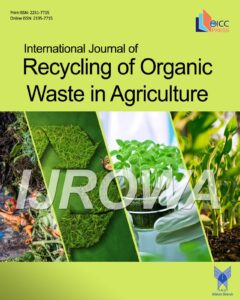Vermicomposting biotechnology: recycling of palm oil mill wastes into valuable products
Authors
Abstract
Background: Palm oil mill effluent and palm press fiber are problematic wastes generated by the palm oil mill industries in Malaysia. This study has endeavored to assess the possibility of the vermicomposting of residue from the palm oil mills using epigeic earthworms Lumbricus rubellus under laboratory conditions. The study was conducted over 50 days using four combinations in three replicates of each treatment as palm oil mill effluent: palm press fiber in 50:50 ratio (T1), palm oil mill effluent/palm press fiber/cow dung in 50:25:25 ratio (T2), palm oil mill effluent/palm press fiber/cow dung/lawn clipping in 50:20:15:15 ratio (T3), and only palm press fiber (T4). Twenty healthy adult L. rubellus with average weight of 3.92 g was introduced. Results: Results showed that T3 has a significant decrease in C/N ratio (14.81 ± 0.07) compared to the other treatments. The presence of cow dung and lawn clipping in the mixtures makes it more suitable for vermicomposting process as early compost productions were recorded in T2 and T3. Conclusion: The study showed that the major polluting problem in palm oil mills can be tackled through vermicomposting technique. Based on the results, vermicompost is found suitable for agriculture purposes as an organic fertilizer as well as soil conditioner.



